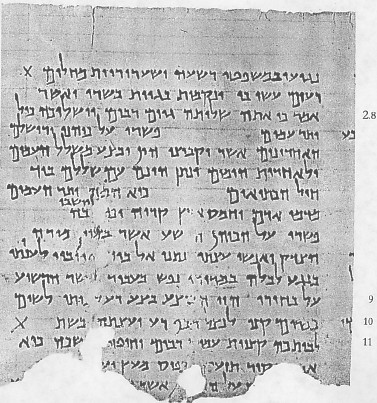
See the preceding page where the same first 9 words of this 17 word verse are written and commented upon. The same 9 words appear again beginning with the 2nd word in line 3 (kiy) and extending to the spatium in the next line. Beginning with "kiy" which is again written without the aleph, perhaps because the next word begins with aleph.
The rest of the verse (introduced with a few of the words in the portion already written 2 times) begins after the spatium of line 7 introduced by "because they are the rest of the people" then the rest of the verse is completed on line 8 and is identical to the M text. What looks like a water mark obscures the word "kol" (all) and the word "ve yoshvey" (and the dwellers of) is edited in above the line having been originally left out. Notice "kiy" with the aleph in the line above.
Because you have looted many nations, all that will remain of the peoples shall loot you, because of (guilt of) human blood and violence of the land, city and those who inhabit it.
Verses 9, 10, and 11 are written together without interruption. This is the longest uncommented upon portion of text in the Pesher thus far. Verse 9 begins after a small spatium as the 3rd word, "hoy" (woe) in line 12. Verse 9 ends in the 5th word in line 13 and verse 10 begins with the next (6th) word "ya'aststah" (you have consulted.) There is some obscurity to some words due to "water marks" which have abraded portions of letters ["lebetho" (to his house) next to last word in line 12 and "mi-kaph" (from the hand of) 4th word in line 13] but all in this verse can be read and the only notable difference is the stem of the verb "to be delivered (from)" which is the 3rd word in line 13. In M it is a 5th stem causative "le-hinnatse:l" and in P it is "le-natsal" a 2nd stem passive.
Woe to the one who is gaining an evil advantage for his household to set his nest on high so he can be delivered from the hand of evil.
The verse begins as noted above with the next to last word in line 13 "ya'atstah" and ends with the remaining portion of the next to last word in the next line followed by "kiy' " which is the first word in verse 11. A portion of the last word in the verse, "naphshekah: (your soul) is lost in the lacuna. It has an additional "he" as does the first word in this line as also does "ya'atstah" to show that the 2ms suf. is an open syllable and not a final consonant. There is a double waw in the 2nd word in line 14 "qitsooth" infin. (cutting). Neither waw should be seen as having consonantal value in this place. The extra waw may be to emphasize the construct relation which is accented in M by adding makkeph. The mem in the 3rd word " 'ammiym" (peoples) is obscured by abrading.
A portion of verse 10 is repeated in the 2nd line of the next page. There the word "qetsoth" (cutting off) has only one waw and not 2 as described above in this page.
You have devised shame on your own house, and by cutting off many nations you are sinning against your own soul.
This verse begins with "kiy' " (spelled with aleph) the last word in line 14 and then much of the remaining part of the verse is obscured by a the lacuna at the bottom of the page but portions of all 7 words in the verse can be seen. The next to last line begins with " 'eben" (stone). The beth is partially missing and the nun lost and the next word is "mi-qiyr" (from the wall) from which only the mem is missing except for the smallest tip remaining. The qoph from the next word is obscured but can be seen: "tiz'aq" (she will cry out) and the kaph from the next word "kapiys" (a beam) is distorted and the last word in the verse "ya'anennah" (he will answer her) has only the yod ayin and the rest is lost in the lacuna.
Because a stone from the wall (of your house) will cry out and a beam from the timber will answer it.
To see the translation of this entire page click here